New Mystery Fish
Posted by: Loren Coleman on April 5th, 2008
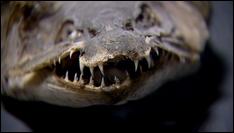
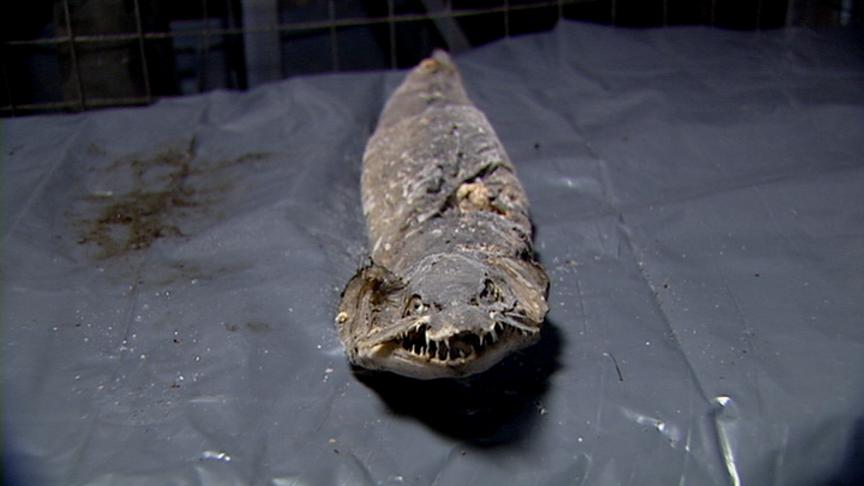
A strange new mystery fish find has turned up from Pioneer Park Pond in Brigham City, Utah. It allegedly has biologists stumped. A fish with fangs was discovered; now officials are trying to figure out what exactly it is.
What do you think?
One thing it is not: a squashed otter.
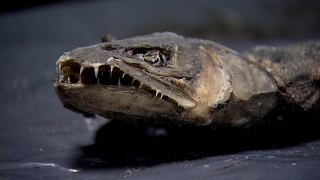
The following is a snakehead:
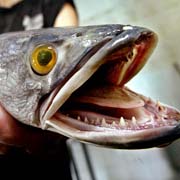
Below is an unidentified fish caught in the Amazon River:
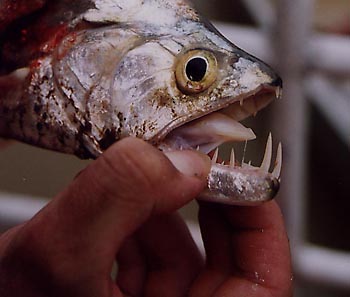
Following, a wolf fish:
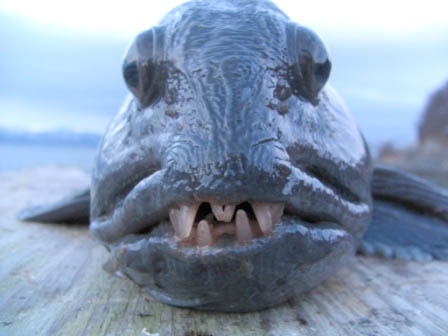
About Loren Coleman
Loren Coleman is one of the world’s leading cryptozoologists, some say “the” leading living cryptozoologist. Certainly, he is acknowledged as the current living American researcher and writer who has most popularized cryptozoology in the late 20th and early 21st centuries.
Starting his fieldwork and investigations in 1960, after traveling and trekking extensively in pursuit of cryptozoological mysteries, Coleman began writing to share his experiences in 1969. An honorary member of Ivan T. Sanderson’s Society for the Investigation of the Unexplained in the 1970s, Coleman has been bestowed with similar honorary memberships of the North Idaho College Cryptozoology Club in 1983, and in subsequent years, that of the British Columbia Scientific Cryptozoology Club, CryptoSafari International, and other international organizations. He was also a Life Member and Benefactor of the International Society of Cryptozoology (now-defunct).
Loren Coleman’s daily blog, as a member of the Cryptomundo Team, served as an ongoing avenue of communication for the ever-growing body of cryptozoo news from 2005 through 2013. He returned as an infrequent contributor beginning Halloween week of 2015.
Coleman is the founder in 2003, and current director of the International Cryptozoology Museum in Portland, Maine.










Snakehead/Giant Snakehead?
Almost looks like a specially designed movie prop or some such.
Possible desicated wolf fish. Released once it got to big for someones aquarium.
I can bet a lot of money that it’s some species of snakehead. But not trout!
The “unidentified fish caught in the Amazon River” is a Hydrolycus scomberoides, locally known as “cachorra” (bitch) or “peixe-cachorro” (dogfish). Its Indian name is “Pirandirá”. There are two varieties of this fish: the H. scomberoides is found in the Amazon River Basin, and the Raphiodon vulpinus has its habitat in the Plata River Basin and the Brazilian Pantanal (Central/Western Wetlands).
I wish we had more pictures of the body…the face is similar to a snakehead, but not exact…I also want to know if this thing was caught or washed up…
I wish there was a ruler visible for size reference. The video clip said it had been run over. Would that also account for the peculiar tail fin, or lack of? And the body shape? Anyway, that is one mean-lookin’ fish. (Ugly, too.)
Actually, this story has more than one mysteries.
How can rapid decomposition make the teeth of trout look sharper? We know it distorts cartilaginous fish like basking sharks turning them into plesiosaur-like corpses, but calciferous teeth?
Did a car run over the entire fish or just the body? The head looks flat and the upper jaw disjointed as if the head was run over too but not squashed as you would expect if a heavy vehicle run over it.
Out of the 4000 fish in the pond, or the pond’s entire population, why was there only one mystery fish?
Why is this mystery fish, a fresh water dweller, compared to a wolf eel that lives in the sea?
What was the mystery animal that dragged the mystery fish to shore?
Well, im from Northern Ontario, and up here i catch alot of Northern Pike, in fact id like to think im good at pike fishing, and thats exactly what this thing looks like to me…and its not uncommon to catch a 4+ footer, and those teeth are so sharp they’ll damn near take a finger off.
It looks a lot like a dessicated snakehead to me.
The fish from the Amazonas is no unidentified species, but a species with the very well describing name “sabertooth” or Payara. The latin name is Hydrolycus scomberoides. This bizarre fish are sometimes even kept in aquariums, but they grow comparably large, and are also good game-fish.
It does look like a squashed snakehead. As for the Amazon fish: I just find it amazing that scientists searching for new fish in the Amazon will just go to the local fish markets in the towns along the river and simply look for them in and among all the other fish. It speaks to the fecundity of the Amazon and the mysteries still shrouded there.
I believe the lake trout theory. They are predators and they do possess sharp teeth. While in life the entire length of the tooth is not evident perhaps more has been exposed through decomposition. My next best guess would be a walleye (Sander vitreus) but it appears as though the fish in question has an adipose fin, a small fleshy fin found in many fishes behind the dorsal. Some fish that have this fin include salmonids, characins and catfishes. The fin is not found in snakeheads, walleye, pike or other possible suspects. In the following picture from another source you can see where I have circled what I believe to be the adipose fin.
http://i65.photobucket.com/albums/h225/centrarchid/fullsize_8dad3604eb49fa55046954730b.jpg
One thing is for sure, it is not a marine wolf fish like the one in the picture above. The anatomy is all wrong.
http://www.skullsunlimited.com/graphics/tq-111-md.jpg
It could however be a freshwater wolf fish (Hoplias malabaricus) from South America. These are pretty common in the fishkeeping hobby and one could have been released by an aquarist.
http://nis.gsmfc.org/photo/Hoplias_malabaricus.jpg
I also do not believe the fish in question is a esox (pike) species.
http://www.dkimages.com/discover/previews/966/45001680.JPG
This fish from the Amazonas is no new species at all, as I already wrote, it is known since many years.
I agree with “brentley”…it’s a squished Northern Pike.
It is no pike. Pike have a longer snout and their eyes are situated over the corner of the mouth, but at this fish they are more anteriorly situated. Pikes have also very typical gill covers, which are frilled at the lower part.
The head has some similarities with those of some trouts or salmons, but the teeth seems to big. Walleyes looks very similar, and have also very big teeth, but they also don´t fit completely. If there would be better photos, the idendification would be much more easier.
Don’t fish tend to have fins? This thing looks like a northern pike in a moldy baguette.
I also agree that it’s most likely a squished Northern Pike; here’s a picture of a 12-15kg Pike:
http://tinyurl.com/66pqyx
Snakehead. Did anyone catch the National Geographic special on the spread of this species? I’m glad to know that something kills them.
Northern Pike is a fish in many Wisconsin waters that looks like that although this one’s a bit vertically squished.
A USDA biologist I know with experience in lake ecosystems and the problem of introduced exotics said her first thought was a northern snakehead. She cautioned that she couldn’t be sure from the pictures whether the dorsal fin looked right, but the dentition did.
Well if they only found one, perhaps it is not capable of reproducing with the othe indigenous fish. That would be a good thing. For those that say it looks like a Northern, wow, not like any in Wisconsin, and I’ve caught hundreds. The eye locations are all wrong.
A USDA biologist I know with some relevant experience said her first guess was northern snakehead. She cautioned she couldn’t tell the shape of the dorsal fin from the photos, but the dentition seemed right.
looks like an ugly fish that was run over by a car?
Looks like a snakehead….
I believe the fish is likely a lake trout. Lake trout do posses sharp teeth. Though they appear longer then on a live specimen I believe this is a result of decomposition exposing them.
It also appears to me that the fish in question has an adipose fin. I circled what I believe to be the adipose in the below photograph from another source.
http://i65.photobucket.com/albums/h225/centrarchid/fullsize_8dad3604eb49fa55046954730b.jpg
The adipose fin is a small fleshy fin located behind the dorsal in salmonids, characans, catfishes etc. If what I’m seeing is an adipose fin that supports the lake trout theory and rules out pike, snakeheads etc. If it is not a lake trout my next best guess is walleye (Sander vitreus).
http://www.emowalleye.com/files/images/chipleer.jpg
The fish is not a wolf fish, at least not a marine wolf fish anyway (Anarhichas lupus). The anatomy is all wrong. Just look at the skull.
http://piclib.nhm.ac.uk/piclib/webimages/0/9000/900/9917_med.jpg
The fish could however be the freshwater South American wolffish (Hoplias malabaricus). These are popular in the aquarium hobby and it would not be unusual for someone to release one.
http://nis.gsmfc.org/photo/Hoplias_malabaricus.jpg
And there is just no way it is a member of the Esox (pike) family. I have a pike skull sitting within view and have seen a lot of live and dead specimens. The head anatomy is all wrong.
http://www.dkimages.com/discover/previews/966/45001680.JPG
http://www.chrismccully.co.uk/data/wl/200707/200707301952img01.jpg
Sand trout?
Seriously, too damaged to be sure of what it is other than I’d hate to have one bite me.
What about Esox lucius? Although it looks like a dessicated snakehead to me…
freshwater wolfish, hoplias malabaricus a common freshwater aquarium fish that reaches about 20″ in length. There is another fresh water wolf fish that get much larger, hoplias aimara ie. hoplias lacerde.
Looks like a Sauger or Saugeye, maybe a Walleye or pike, I can see where the dorsal fin used to be and where the tail fin has been removed. The head was crushed when it was run over thus distorting the face.
Come on pike people, no way that thing is a pike. It definitely lacks the pike “beak”. A Walleye would be more likely than a pike.
It sure looks like a Snakehead to me.
It is certainly not a wolf fish or anything like that. There are many common predatory fish with similar facial features, but judging by the body shape it could be a snakehead. It doesn’t seem to have any fins attached so it’s hard to say. I’m surprised no one has DNA tested this thing yet, that seems like the obvious thing to do.
DNA testing is expensive and needs time. Why should anybody pay money for such a fish? Furthermore, it would be no problem to identify it, if there would be better photos, analyses of the skull and the scales.
alright it’s defenently not a pike and i have got to say no to walleye to i think it could be a snakehead but if it is it’s defenently crushed and i wonder what kind of “animal” draged it from the pond.
I think the fish is a Aimara
iknow the first one is meraya its my culter i know becouse i love to fish a lot the other i don’t know
the last on is a cousin of the meraya its the deadliest fish in are lake
the sneake head is also the cousin of the meraya its cree for death its not deadly but it still packs a punch